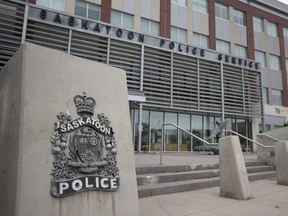Saskatoon police board to keep studying drug decriminalization
The Saskatoon Board of Police Commissioners is expected to resume the discussion on how to best address substance use in the community, including decriminalization, later this year.

Article content
After a nearly two-hour discussion of two reports examining potential ways to respond to problem drug use in Saskatoon, including decriminalization, the board of police commissioners approved motions to seek more information.
At Thursday’s Saskatoon board of police commissioners meeting, commissioners approved motions to endorse continued investigation of the right model of decriminalization for Saskatchewan and to ask the Saskatoon Police Service to compile a new report on diversion of drug charges to the health system.
During the meeting, the commission heard from Supt. Patrick Nogier, who compiled the Saskatoon police’s report and two University of Saskatchewan researchers, Barbara Fornssler and Lori Hanson, who co-authored the accompanying P5 project report.
The police’s report had provided an overview of decriminalization and statistics relating to charges of simple drug possession. The P5 report looked at how addressing housing, safe drug supply, treatment and decriminalization would help stabilize people who use drugs.
Among its recommendations is that the City of Saskatoon apply for a municipal exemption to the federal government under Canada’s drug laws to decriminalize personal possession of drugs and that, while the application is in progress, police avoid laying such charges.
It also recommended a public education campaign be launched.
Hanson, a professor in the department of community health, told the board decriminalization would bring drug use out of hiding and into the light.
Saskatoon police Chief Troy Cooper told media after the meeting there’s already a de facto approach to decriminalization of personal drug possession offences in the court process, when the federal Crown prosecutor determines whether or not to proceed.
He said police wanted to study when it was police were laying these charges and they found that in a lot of the cases the charges were legitimate, such as drug possession in custody or when someone had many outstanding warrants and were in possession of drugs.
These charges also alert prosecutors about the involvement of drugs or addictions in offending, he explained.
“I think it’s important for us to know what’s occurring, what our experience has been, so when we look at things like diversion and maximizing diversion, we … begin with a reality of what’s occurring here before we start building other systems,” Cooper said.
The police’s report on diversions will include a look at opportunities to use diversion pre-charge and post-charge and options police would like to see.
Board vice-chair Kearney Healy, whose motion last summer led to the police’s report, said during the meeting he didn’t feel the board was in a position to make a recommendation as to what the exact next steps should be, likening doing so to interrupting a conversation halfway through. He suggested the discussion resume this fall.
Cooper said this is a good initial discussion, but for now, police across the country support decriminalization when there’s a diversion to another, health-led, process.
“That doesn’t mean that we support not arresting people when they’re breaking the law and they’re in possession of dangerous drugs.”
The news seems to be flying at us faster all the time. From COVID-19 updates to politics and crime and everything in between, it can be hard to keep up. With that in mind, the Saskatoon StarPhoenix has created an Afternoon Headlines newsletter that can be delivered daily to your inbox to help make sure you are up to date with the most vital news of the day. Click here to subscribe.








Postmedia is committed to maintaining a lively but civil forum for discussion. Please keep comments relevant and respectful. Comments may take up to an hour to appear on the site. You will receive an email if there is a reply to your comment, an update to a thread you follow or if a user you follow comments. Visit our Community Guidelines for more information.